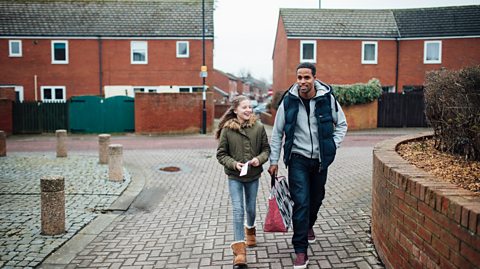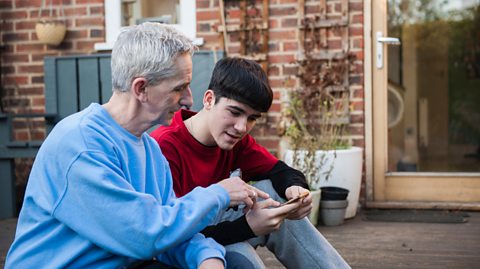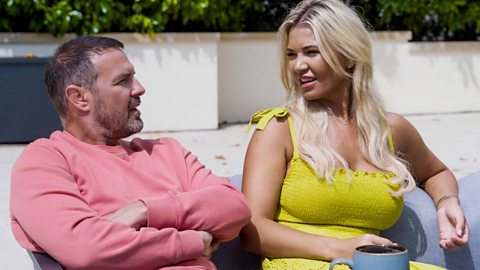As a parent, watching your child struggle with their mental health can be heart-breaking, but talking to your child about how theyÔÇÖre feeling can be difficult too. You may find yourself worrying about saying the right thing, or whether itÔÇÖs the right time or place to bring something up.
We've got some tips below to help you start - and follow up - those all-important conversations about mental health, with confidence.
Do an activity together

To make things less intense for you and your child, and to help prevent them from feeling like theyÔÇÖve been put on the spot, try setting aside twenty minutes with them to do an activity youÔÇÖll both enjoy. This will create a relaxed space where you can ask them about how theyÔÇÖre feeling.
There are loads of fun activities to choose from ÔÇô just remember to keep it simple and enjoyable for you both, so that thereÔÇÖs time to chat too. Doing something positive with your child can help to reassure them and reduce their anxiety, you're also creating a space for them to talk through their feelings without having a ÔÇÿbig chat.ÔÇÖ
Start the conversation

The most important thing to remember is that you're instigating this conversation to give you both the opportunity to talk about feelings and to provide comfort.
If youre stuck on what to say, you could consider starting off with something general, for instance
- How are you feeling?
- What do you think was the best and worst part of your day?
- If you could start today again, what would you differently?
If theres something in particular that needs to be addressed, or you think your child may need a bit more support with opening up, you could ask some more serious questions. Some examples include
- What was the biggest problem you had today?
- Do you want to talk about whatÔÇÖs going on?
- How can I support you through this?
- Is there anything you need from me? Space, time to talk, or maybe more time to do something fun together?
- Is there anyone who is upsetting you?
If there has been a bereavement, you could ask directly about how they are coping since that person died.
Let them know that itÔÇÖs okay to keep things private, but that youÔÇÖd like to talk to them about whateverÔÇÖs bothering them.
While these examples may come in handy, theyÔÇÖre not the only things that you can ask. Go with what feels right, but just remember to be gentle in your approach.
Be thoughtful and reassuring

Your child may be facing a lot of pressure already, so make sure they know you love them, and reassure them that youÔÇÖre proud of them no matter what. When you do speak to them, listen to them without judgement if they choose to open up to you, and make sure that they know that youÔÇÖre on their side and will help them get through this.
Keep in mind that your child may not be ready to open up. If this is the case, let them know that youÔÇÖre concerned about them, and are there for them if they need you. If you think theyÔÇÖre not comfortable talking to you face-to-face, sending a text or a letter can work better if you think your child would prefer to communicate this way.
Even if it takes a while for them to talk, donÔÇÖt give up on them. Take their cues and try not to push them too hard or get upset with them for not opening up straight away, as it could take some time.
Follow up

When your child opens up to you, be sure to listen to them and give them a chance to explain properly before trying to say anything. Even young children can understand feelings and behaviour if you give them a chance to talk about it.
Take it gently and give them examples to help guide them, for example
- 'When you said you hated Aisha, you looked really angry.'
- 'What was making you so cross?'
- 'When you canÔÇÖt get to sleep, is there anything on your mind making you worried?'
Thank them for sharing whatÔÇÖs going on, be encouraging about the way theyÔÇÖve opened up and acknowledge and validate their feelings. Ask them if thereÔÇÖs anything in particular that you could do to help them and try to reflect why theyÔÇÖre feeling the way they are.
There could be multiple reasons why they are feeling the way they are - discuss whether there are any changes that could be made to help make things easier. It can also help to ask your child directly what they think would help them to feel better ÔÇô they often have good ideas about solving their own problems.
If you think your child needs more support, let them know about helplines, textlines and online services that are available to them. You could also speak to your GP, who can provide help and refer them to mental health services if needs be. You could look at the resources together.The ┤¾¤¾┤½├¢ Action Line is a good place to start.
The ┤¾¤¾┤½├¢ Headroom campaign has links to lots of helpful content.
If youÔÇÖre not sure of what to do and need some extra support, visit the website for more advice.
By Stevie Goulding, Parents Helpline Manager for the charity Young Minds

More from ┤¾¤¾┤½├¢ Bitesize Parents' ToolkitÔǪ
Parents' Toolkit
Fun activities, real-life stories, wellbeing support and loads of helpful advice - we're here for you and your child.

CanÔÇÖt sleep, wonÔÇÖt sleep? Five ways to get your childÔÇÖs sleep back on track
Advice and tips on helping your kids into healthier sleep patterns

Five tips to support the after-school ÔÇÿmeltdownÔÇÖ
Expert advice on how to cope with after-school restraint collapse as a parent.

How to manage your childÔÇÖs online world without clashing
Children and teens spend lots of time online for school and leisure, which can be a worry for parents. Here's some advice on managing your childÔÇÖs screen time.

Leigh-Anne Pinnock: Talking about race with my family
Little Mix star Leigh-Anne Pinnock and her family discuss their experiences of racism and their different approaches to talking to their children about race.

Christine McGuinness - How my autism can help me to help my kids
Christine McGuinness talks about the positives and challenges she's faced through her life as a mum since diagnosis.
